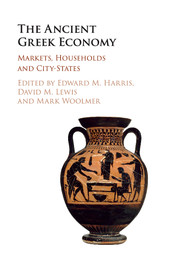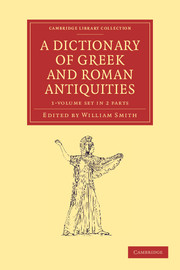Refine search
Actions for selected content:
23990 results in Ancient history
Chapter 29 - Greek federalism, the rediscovery of Polybius, and the framing of the American constitution
-
-
- Book:
- Federalism in Greek Antiquity
- Published online:
- 05 November 2015
- Print publication:
- 05 November 2015, pp 512-523
-
- Chapter
- Export citation
Chapter 28 - Ancient theoretical reflections on federalism
-
-
- Book:
- Federalism in Greek Antiquity
- Published online:
- 05 November 2015
- Print publication:
- 05 November 2015, pp 503-511
-
- Chapter
- Export citation
Chapter 16 - Molossia and Epeiros
-
-
- Book:
- Federalism in Greek Antiquity
- Published online:
- 05 November 2015
- Print publication:
- 05 November 2015, pp 297-318
-
- Chapter
- Export citation
Chapter 5 - Aitolia and the Aitolian League
-
-
- Book:
- Federalism in Greek Antiquity
- Published online:
- 05 November 2015
- Print publication:
- 05 November 2015, pp 86-117
-
- Chapter
- Export citation
Chapter 17 - Federal Makedonia
-
-
- Book:
- Federalism in Greek Antiquity
- Published online:
- 05 November 2015
- Print publication:
- 05 November 2015, pp 319-340
-
- Chapter
- Export citation
Part I - Festivals in the Greek East before Constantine
-
- Book:
- Roman Festivals in the Greek East
- Published online:
- 05 November 2015
- Print publication:
- 05 November 2015, pp 9-102
-
- Chapter
- Export citation
Chapter 3 - Theodosius’ reform of the legal calendar
- from Part II - Roman festivals in the Greek East after Constantine
-
- Book:
- Roman Festivals in the Greek East
- Published online:
- 05 November 2015
- Print publication:
- 05 November 2015, pp 105-127
-
- Chapter
- Export citation
Chapter 18 - The Chalkidike and the Chalkidians
-
-
- Book:
- Federalism in Greek Antiquity
- Published online:
- 05 November 2015
- Print publication:
- 05 November 2015, pp 341-357
-
- Chapter
- Export citation
Chapter 8 - Kalendae Ianuariae again, and again
- from Part II - Roman festivals in the Greek East after Constantine
-
- Book:
- Roman Festivals in the Greek East
- Published online:
- 05 November 2015
- Print publication:
- 05 November 2015, pp 219-225
-
- Chapter
- Export citation

The Ancient Greek Economy
- Markets, Households and City-States
-
- Published online:
- 05 November 2015
- Print publication:
- 12 November 2015
Chapter 7 - The Brumalia
- from Part II - Roman festivals in the Greek East after Constantine
-
- Book:
- Roman Festivals in the Greek East
- Published online:
- 05 November 2015
- Print publication:
- 05 November 2015, pp 201-218
-
- Chapter
- Export citation
Chapter 5 - The Lupercalia from Augustus to Constantine Porphyrogennetos
- from Part II - Roman festivals in the Greek East after Constantine
-
- Book:
- Roman Festivals in the Greek East
- Published online:
- 05 November 2015
- Print publication:
- 05 November 2015, pp 163-183
-
- Chapter
- Export citation
Chapter 25 - The Hellenic leagues of late Classical and Hellenistic times and their place in the history of Greek federalism
-
-
- Book:
- Federalism in Greek Antiquity
- Published online:
- 05 November 2015
- Print publication:
- 05 November 2015, pp 452-470
-
- Chapter
- Export citation
Chapter 14 - Elis (with Akroria and Pisatis)
-
-
- Book:
- Federalism in Greek Antiquity
- Published online:
- 05 November 2015
- Print publication:
- 05 November 2015, pp 269-284
-
- Chapter
- Export citation
Copyright page
-
- Book:
- Roman Festivals in the Greek East
- Published online:
- 05 November 2015
- Print publication:
- 05 November 2015, pp vi-vi
-
- Chapter
- Export citation
Chapter 12 - The Thessalian League
-
-
- Book:
- Federalism in Greek Antiquity
- Published online:
- 05 November 2015
- Print publication:
- 05 November 2015, pp 231-249
-
- Chapter
- Export citation
Chapter 26 - Peaceful conflict resolution in the world of the federal states
-
-
- Book:
- Federalism in Greek Antiquity
- Published online:
- 05 November 2015
- Print publication:
- 05 November 2015, pp 471-486
-
- Chapter
- Export citation
Copyright page
-
- Book:
- Federalism in Greek Antiquity
- Published online:
- 05 November 2015
- Print publication:
- 05 November 2015, pp iv-iv
-
- Chapter
- Export citation
Part II - Roman festivals in the Greek East after Constantine
-
- Book:
- Roman Festivals in the Greek East
- Published online:
- 05 November 2015
- Print publication:
- 05 November 2015, pp 103-238
-
- Chapter
- Export citation

A Dictionary of Greek and Roman Antiquities
-
- Published online:
- 05 November 2015
- Print publication:
- 28 March 2013
- First published in:
- 1842
